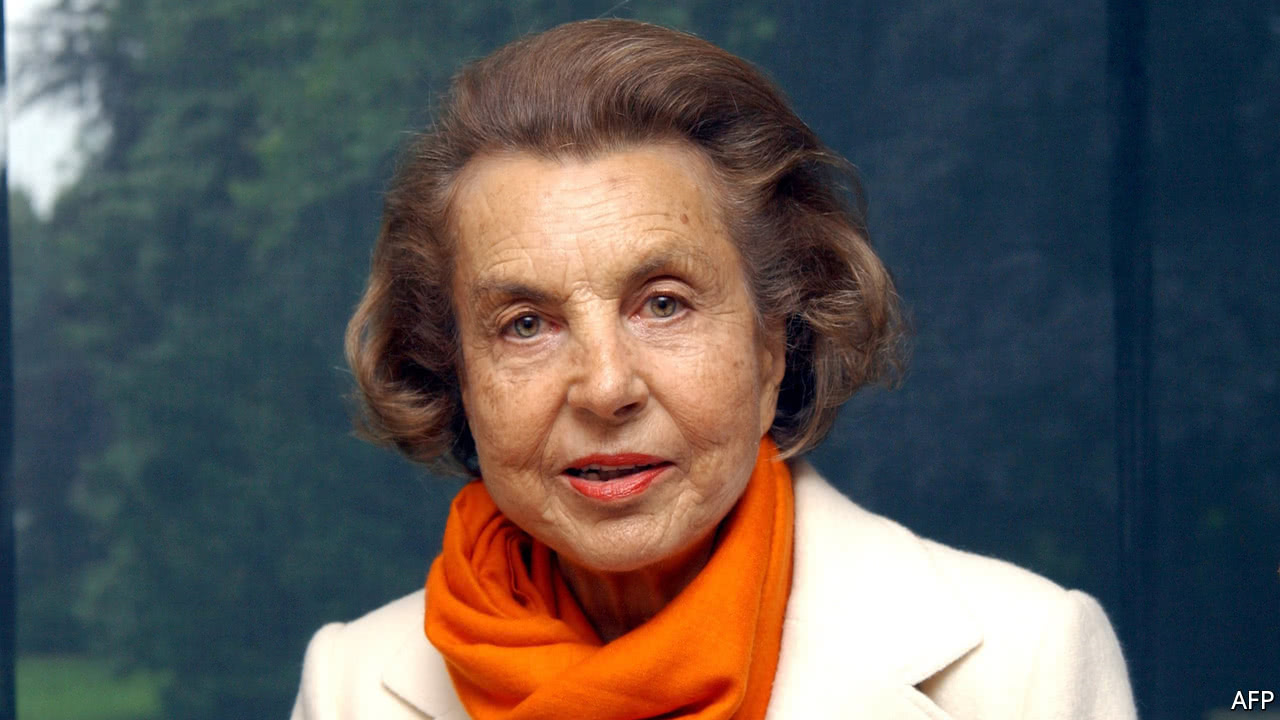
DEATH does not end all uncertainties. News that Liliane Bettencourt, a glamorous 94-year-old Parisian heiress, died on September 20th has provoked a flurry of investor speculation over L’Oréal, the world’s biggest cosmetics company. She had held a controlling stake in the firm her father, an inventor of hair dyes, founded in 1909. Its market value has since grown to be a whisker short of €100bn ($117bn).
Her death brings few immediate consequences. An Alzheimer’s sufferer, she had been declared legally unfit to manage her concerns. That followed a scandal, made public in 2010 after her butler secretly recorded politicians, lawyers and friends as they bilked her for millions of euros. The case still haunts Nicolas Sarkozy, an ex-president. He seethed in October that opponents had stymied his return to politics by repeating allegations he profited from the “sordid Bettencourt affair” (he was cleared of charges over it in 2013).
-
Sotheby’s launches a new prize for cutting-edge curators
-
Why does Google look different in Europe?
-
Jeremy Corbyn’s Brighton speech marks the surrender of Labour’s moderates
-
The water crisis in Flint, Michigan has had terrible consequences for residents’ health
-
Saudi Arabia will finally allow women to drive
-
Why a Labour government might mean a fall in sterling
One nurse of Ms Bettencourt likened her household to a “basket of crabs”, as staff and others battled to pinch her wealth. The drama eased in the past six years after her daughter took control of the family assets, including the one-third stake in L’Oréal. The family affirmed, on September 21st, their “entire commitment and loyalty to L’Oréal” and its chief executive, Jean-Paul Agon.
That suggests no big changes are looming at the firm, which is considered a fleuron, or ornament, of France’s corporate scene. It is certainly flourishing under Mr Agon. L’Oréal’s share price has almost doubled in the past five years. It earned strong operating profits of €4.5bn last year, on sales of €26bn, and expects that profits this year should reach a record 18% of sales.
Investors are watching one matter closely—whether relations now change with Nestlé, the world’s biggest food company. It holds a 23.2% stake in L’Oréal, the result of a deal Ms Bettencourt struck in the 1970s to fend off Socialist politicians she feared could nationalise the family firm. Recurrent speculation suggests that Nestlé, which reduced its stake once already, could divest entirely—or might decide to bid for L’Oréal outright. The deal lets either side increase ownership of L’Oréal only six months after Ms Bettencourt’s death.
In the event, the news came just before Nestlé’s newish chief executive, Ulf Mark Schneider, was due to offer his plans to investors for the first time, on September 26th. Shareholders have long quipped that the seller of Nescafé, KitKats and Purina pet food has grown stale and lament its loss of market share to fresher rivals. Pressure has risen further after an activist hedge fund, Third Point, in June said it had bought a $3.5bn stake in Nestlé.
Mr Schneider set a goal of achieving profit margins of 17.5% to 18.5% by 2020, speeding up share buy-backs and lifting sales of fast-growing products (mostly caffeine-related). The activists wanted all that, but he bluntly refused their demand also to sell the L’Oréal stake, which they say has no part in the firm’s strategy. Mr Schneider retorted that the stake constitutes a “fabulous” investment, generating an average of 12% annual returns in the past 42 years.
Politics would probably not get in the way of buying L’Oréal outright. France’s strongly pro-European president, Emmanuel Macron, would struggle to oppose a purely European takeover. And other conglomerates show an appetite for beauty. Unilever, an Anglo-Dutch behemoth, is shifting its portfolio from food to faster-growing categories such as shampoo and skin creams. On September 25th it said it will buy Carver Korea, a Korean beauty firm, for €2.27bn.
Yet for Nestlé, taking over L’Oréal would be a financial stretch, and looks impossible without the Bettencourts’ agreement. They show no sign of wanting to sell. The French firm might be willing to do the opposite, buying out the Nestlé investment, for example if it raised funds by selling its own €10bn stake in Sanofi, France’s biggest drugmaker. The domino effect of undoing the Nestlé-L’Oréal pact might mean even more uncertainties ahead.
Source: economist
A shareholder pact is rocked by Liliane Bettencourt’s death